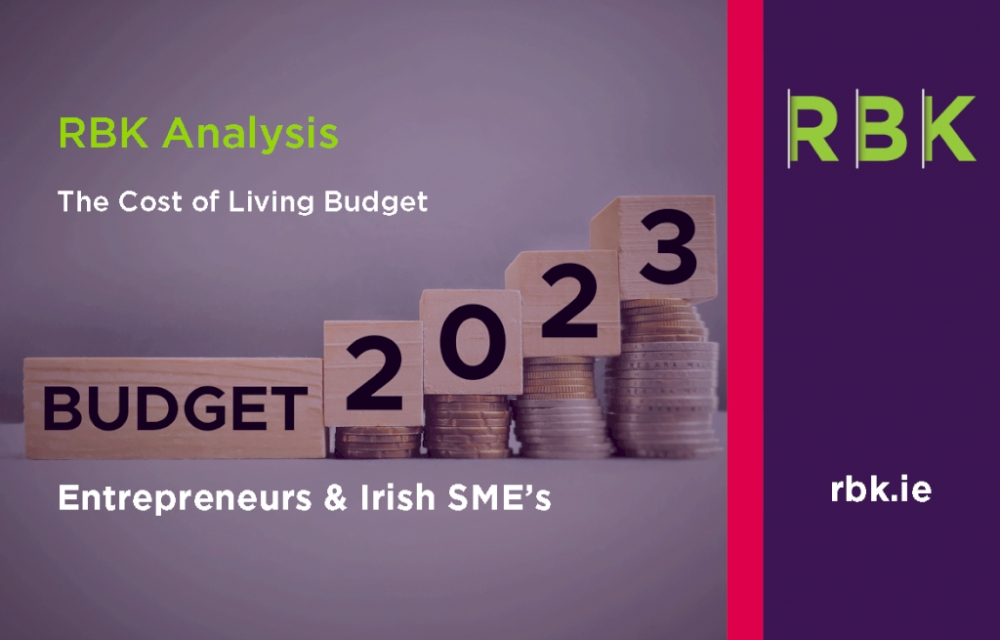Entrepreneurs
Entrepreneurs and SME’s are vital to the success of the Irish economy. The current challenges posed to Ireland in the international tax landscape have made it even more apparent that developing and supporting domestic entrepreneurship must become a key focus for policy makers in the years to come. Ireland’s economic policy for many decades revolved around attracting foreign direct investment. Ireland’s economy has changed fundamentally over the last few decades. Ireland is not a low cost country and the skills are knowledge based. It has been emphasised by the Department of Finance that Ireland has an over reliance on MNE’s with recent statistics showing that a third of all tax is generated by 500,000 taxpayers and just 10 companies.
As Ireland has developed and grown in confidence it is critical that the country’s taxation system actively encourages and supports indigenous entrepreneurial business. Certainly from a Government perspective, the taxation policy is very important – not just lip service but actual support for entrepreneurship. It can sometimes be overlooked that entrepreneurs are risk takers. They generate ideas, incubate them and if successful they create employment and taxation revenue for the State. They also contribute significantly to the business culture - where businesses see other Irish businesses succeed it can have an effect of encouraging others – success breeds success. Entrepreneurs, especially in the tech sector, can be very mobile and there is always the risk of them setting up in other jurisdictions if they feel that there is more support elsewhere.
It is clear that Ireland needs to diversify and encourage the indigenous SME sector which accounts for 99.8% of all Irish enterprises and is responsible for employing over two-thirds of Ireland’s workforce. We have summarised below some welcome measures that could be announced in Budget 2023 that we believe could support the SME sector.
Employment Investment Incentive Scheme (EIIS)
Access to cash and funding is vital for any business. For many SMEs the financing options can be limited. Whilst multi-nationals tend to have access to funding from abroad and are therefore less dependent on finance from local sources, SMEs are dependent on raising finance locally, principally bank finance. With the exit of Ulster Bank and KBC from the Irish market there are even less banking options available.
Therefore another option for financing is private investment. In this regard the EIIS is a scheme aimed at boosting investment in indigenous SME’s by offering investors income tax relief on their investment. There have been positive changes to the scheme in recent Budgets, however, there is room for further improvement with Finance Minister, Paschal Donohoe, saying that future reform of the EII was intended to respond to how " the pandemic has affected private investor confidence ", and to boost " the flow of available private equity investment into Irish companies ."
EIIS is vital to the support of indigenous business. Below are some suggestions made by stakeholders that could simplify the process to make the scheme more attractive for investors:-
- Reversal of the requirement to “self certify” eligibility. This creates risk for investors of Revenue challenge post investment. Reinstate advance Revenue approval.
- Allowing CGT losses made on EIIS investments to be available for offset against other gains which would eliminate investment risk for individuals
- Further simplification of the application process to make the scheme more accessible. Currently the scheme is overly complex from an administrative point of view which can deter companies from applying.
Entrepreneur Relief
Entrepreneur Relief is a popular relief which allows a shareholder a reduced rate of CGT (10%) on the sale of shares in a qualifying business. The objective of the relief is to support and encourage entrepreneurial activity, however, in practice the relief mainly applies to owner-managed businesses due the stringent conditions applying to the relief. The following reforms would make the relief more accessible to entrepreneurs and investors:-
- Increase in the €1m lifetime limit. This can be increased incrementally over a number of years, say to €5m. Amounts in excess of €1m could be taxed at a higher graduated rate e.g. 15% or 20%.
- Amendment to the working time requirement which requires an individual to spend 50% of their working time in the company. This along with a reduction in the 5% minimum holding requirement will encourage investment activity in the SME sector. The working time requirement is unnecessary and effectively means that angel investors can’t qualify.
- Amendment to the definition of qualifying companies. Currently, the relief will not apply where there is a dormant/non trading entity in the group. This can be restrictive for investors and is irrational. In many group structures there are may be different entities for commercial reasons or to diversify risk. This requirement ignores the commercial reality of how businesses operate.
Key Employment Engagement Programme (KEEP)
A fundamental weakness in the Irish tax system is that Irish tax legislation imposes income tax on the allotment of shares in companies to employees at less than “market value”. SMEs are unquoted and therefore there is no ready market for employees to dispose of their shares. This simply means that employees suffer income tax on “paper” gains without any ability to sell the shares to realise the cash.
The KEEP scheme is a tax incentive aimed at SME’s which allows them to use share options as a form of staff remuneration. The intention behind the scheme is that gains arising to the employee in respect of the KEEP share options would be taxed at the time of share sale (when cash is generated) and subject to Capital Gains Tax (CGT) rather than income tax. Although the scheme is relatively new the uptake from SME’s has been moderately low. The scheme is a great example of good idea, poor implementation.
The Tax Strategy Group in July 2022 set out a number of potential changes to the scheme in their review, which include:
- Applying a safe harbour for valuations with detailed guidance on how to value the company. Currently, a third party valuation of the shares is required which is a costly exercise for smaller companies. The cost of valuing the company is cited as a major deterrent for companies deciding whether to apply the scheme.
- Update of the scheme confirming that CGT relief will apply to a buyback of shares as opposed to income tax treatment. There is a lack of liquid market for the sale of SME shares. By allowing CGT treatment to apply to the buyback of shares, this would make the scheme more attractive to employees
- Review of the rules regarding the definition of ‘holding company’ and ‘qualifying group’. Common SME group structures being ineligible for KEEP is a huge barrier.
- Increase to the current €3m cap on shares.
For SMEs the ability to offer some equity interest to employees is about attracting and retaining talent. We would like to see the scheme simplified so that more SMEs would consider availing of the scheme. It is too complex and burdensome at present. It should be easy to administer. Deferring any ultimate tax charge until the shares are realised and cash generated is vital.
Summary
Taxation policy is critical, not just in the context of raising revenue for the Government for investment in public services but also in relation to the message that it sends about the country. Is Ireland a country that actively supports indigenous business, encourages investment in innovation and new ventures and encourages wider employee share ownership? There are a number of positive tax changes that the Government can make in Budget 2023 that can benefit the Irish SME sector. The sector struggled during the pandemic and now in the wake of the current cost of living and energy crisis Government support is essential to ensure the sector develops and grows. It is important that Irish business are not left behind.



